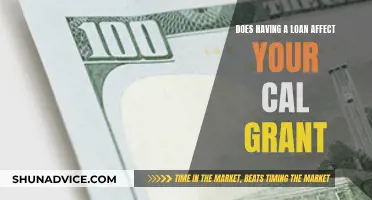
Ginnie Mae, or the Government National Mortgage Association (GNMA), is a government-owned corporation that helps Americans access affordable mortgage loans. Unlike similar organisations such as Fannie Mae and Freddie Mac, Ginnie Mae does not originate or purchase mortgage loans, nor does it buy, sell or issue securities. Instead, Ginnie Mae guarantees the timely payment of principal and interest on mortgage-backed securities (MBS) issued by approved lenders, even if homeowners default on the underlying mortgages. This backing from the US government means that investors do not need to worry about the impact of late payments or defaults on their investment.
| Characteristics | Values |
|---|---|
| Type of Organization | Government-owned corporation |
| Owner | U.S. Department of Housing and Urban Development (HUD) |
| Function | Guarantees securities backed by single-family and multifamily loans insured by government agencies |
| Agencies Supported | Federal Housing Authority, Department of Veterans Affairs, Department of Housing and Urban Development, Department of Agriculture |
| Loan Types | FHA, VA, USDA |
| Loan Features | No mortgage insurance, 1% guarantee fee, no down payment, lower interest rates |
| Benefits | Affordable housing, increased liquidity in the mortgage market, support for first-time and low-income home buyers |
What You'll Learn

Ginnie Mae's role in affordable housing
The Government National Mortgage Association (GNMA), or Ginnie Mae, is a government-owned corporation of the United States Federal Government within the Department of Housing and Urban Development (HUD). It was founded in 1968 to promote affordable homeownership and expand affordable housing by guaranteeing housing loans (mortgages) and lowering financing costs such as interest rates for those loans.
Ginnie Mae guarantees securities backed by single-family and multifamily loans insured by government agencies, including the Federal Housing Authority (FHA), Department of Veterans Affairs (VA), the Department of Housing and Urban Development’s Office of Public and Indian Housing, and the Department of Agriculture’s Rural Development. Ginnie Mae does not originate, purchase, or underwrite loans. Instead, it guarantees mortgages on single-family and multifamily properties, making it more affordable for low-income families and first-time home buyers to secure financing.
Ginnie Mae accomplishes its goal of increasing access to affordable mortgage loans through two functions. Firstly, it guarantees U.S. government loans, thereby reducing the risk for lenders and investors. This enables lenders to offer more appealing rates and more flexible qualifying factors to home buyers. Secondly, Ginnie Mae mitigates risk for mortgage investors, increasing liquidity in the mortgage market. By guaranteeing and issuing certain mortgage-backed securities (MBSs), Ginnie Mae allows lenders to sell mortgages on the secondary market, freeing up capital and allowing them to underwrite more loans.
Ginnie Mae's efforts particularly aid those traditionally underserved in the mortgage market, including first-time home buyers and low-income borrowers. The guarantee Ginnie Mae offers gives banks additional liquidity, allowing them to be more flexible with their underwriting guidelines. This means that lenders can accept loans from borrowers with less-than-perfect credit and still offer lower interest rates. As a result, borrowers without large down payments, perfect credit, or low debt-to-income ratios can secure a mortgage backed by a government agency, making it easier for many to find affordable housing.
Freddie Mac Loan Lookup: What You Need to Know
You may want to see also

Ginnie Mae's loan guarantees
Ginnie Mae, or the Government National Mortgage Association (GNMA), is a government-owned corporation that guarantees timely payments on mortgage-backed securities (MBSs). It is part of the Department of Housing and Urban Development (HUD) and was founded in 1968 to expand affordable housing.
Ginnie Mae does not originate, purchase, or sell mortgages or securities. Instead, it guarantees mortgages on single-family and multifamily properties, making it more affordable for low-income families and first-time home buyers to secure financing. It guarantees securities backed by loans insured by government agencies, including the Federal Housing Authority, the Department of Veterans Affairs, the Department of Housing and Urban Development's Office of Public and Indian Housing, and the Department of Agriculture's Rural Development.
Ginnie Mae's role is to guarantee to investors the on-time payment of mortgage-backed securities (MBS) even if homeowners default on the underlying mortgages and the homes are foreclosed upon. This provides investor protection against borrower default and helps maintain liquidity in the mortgage market. It also allows lenders to offer more appealing rates and more flexible qualifying factors to borrowers.
Ginnie Mae's activities are projected to reduce the budget deficit under normal or moderately stressful economic conditions. However, in a period of severe economic stress, the corporation could be exposed to losses. For example, in a stress scenario analysed by the CBO, Ginnie Mae's new guarantees were projected to increase the deficit.
Ginnie Mae is one of three major bond issuers that facilitate funding for most consumers in the real estate market. It is similar to Fannie Mae and Freddie Mac but is a wholly-owned government corporation, whereas the other two are government-sponsored enterprises that are privately owned by shareholders.
Gabbana's Fashionable Friendship with Melania Trump
You may want to see also

Ginnie Mae's impact on the mortgage market
The Government National Mortgage Association, also known as Ginnie Mae, is a federal government corporation that guarantees loans for organizations such as the FHA, USDA, and VA. Ginnie Mae does not originate or underwrite loans, but it does guarantee mortgages on single-family and multifamily properties, making it more affordable for low-income families to secure financing.
Ginnie Mae guarantees the timely payment of principal and interest on mortgage-backed securities (MBS) issued by approved lenders. This means that Ginnie Mae covers a part of the lender's losses if a borrower stops making payments. This guarantee entices more investors, making the mortgage market more liquid. By guaranteeing mortgage-backed securities, Ginnie Mae helps to keep liquidity in the mortgage market. This allows lenders to offer more appealing rates and more flexible qualifying factors to home buyers.
Ginnie Mae is an important part of the mortgage market. Without its guarantee, there would be much less demand for mortgage-backed securities, decreasing lenders' liquidity and making it much harder to secure a mortgage. Ginnie Mae's guarantee also helps many first-time home buyers by providing them with a more affordable mortgage through a government loan. For example, FHA loans are a popular option for many first-time homeowners because of their less strict credit score and down payment requirements.
Ginnie Mae is a wholly-owned government corporation, whereas similar organizations like Fannie Mae and Freddie Mac are "government-sponsored enterprises" (GSEs) that are privately owned by shareholders. Ginnie Mae is regulated by the Department of Housing and Urban Development (HUD), which also owns and operates it.
Fannie and Freddie: College Loan Options Explored
You may want to see also

Ginnie Mae's relationship with government agencies
Ginnie Mae, or the Government National Mortgage Association, is a wholly-owned government corporation within the Department of Housing and Urban Development (HUD). It was founded in 1968 to help Americans access more affordable mortgage loans.
Ginnie Mae guarantees the timely payment of principal and interest payments on residential mortgage-backed security (MBS) instruments to institutional investors worldwide. These MBS instruments are commonly referred to as "pass-through" certificates, as the principal and interest of the underlying loans are "passed through" to investors. Ginnie Mae's financial backing makes these MBS instruments particularly attractive to investors.
Ginnie Mae guarantees only securities backed by single-family and multifamily loans insured by government agencies, including the Federal Housing Authority (FHA), Department of Veterans Affairs, the Department of Housing and Urban Development’s Office of Public and Indian Housing, and the Department of Agriculture’s Rural Development.
Ginnie Mae does not originate, purchase, or sell mortgage loans or securities. Instead, private lending institutions approved by Ginnie Mae originate eligible loans, pool them into securities, and issue Ginnie Mae MBS instruments. These lending institutions include geographically diverse mortgage companies, commercial banks, thrifts, and state housing finance agencies.
Ginnie Mae's role in guaranteeing MBS products helps keep liquidity in the mortgage market. By guaranteeing U.S. government loans, Ginnie Mae reduces risk for lenders and investors, allowing lenders to offer more appealing rates and more flexible qualifying factors to borrowers. This enables borrowers with less-than-perfect credit to secure mortgages backed by a government agency, making it more affordable for low-income families to obtain financing.
Ginnie Mae: Buying Loans and Supporting the Market
You may want to see also

Ginnie Mae's history and creation
The Government National Mortgage Association (GNMA), or Ginnie Mae, was established in 1968 as part of the U.S. Department of Housing and Urban Development (HUD). Ginnie Mae was created to promote affordable homeownership and is a government-owned corporation of the United States Federal Government.
Ginnie Mae is the result of a split from the Federal National Mortgage Association (FNMA), also known as Fannie Mae, which was founded in 1938. Thirty years after its establishment, Fannie Mae had grown so large that it was divided into two separate entities: Fannie Mae and Ginnie Mae. Going forward, Fannie Mae would purchase conventional loans, while Ginnie Mae would purchase government-backed mortgages, such as FHA and VA (Veterans Administration) loans. When the split took place, Fannie Mae was converted from a government-sponsored enterprise (GSE) to a publicly traded company. Ginnie Mae, on the other hand, was established as a GSE and remains so today as part of the Department of Housing and Urban Development.
Ginnie Mae is unique in that it is the only home-loan agency explicitly backed by the full faith and credit of the United States government. It guarantees the timely payment of principal and interest on mortgage-backed securities (MBSs) issued by approved lenders. Ginnie Mae does not create, buy, sell, or issue mortgages or securities. Instead, it operates behind the mortgage market, guaranteeing investors the on-time payment of MBS even if homeowners default on the underlying mortgages and the homes are foreclosed upon. These MBS instruments are commonly referred to as "pass-through" certificates because the principal and interest of the underlying loans are "passed through" to investors.
Ginnie Mae has played a key role in supporting and expanding the U.S. housing market, especially for low-to-moderate-income Americans. By guaranteeing MBS products, Ginnie Mae lowers financing costs, such as interest rates, for those loans. This makes Ginnie Mae-backed MBS instruments particularly attractive to investors.
Freddie Mac: Construction Loan Options and Opportunities
You may want to see also
Frequently asked questions
Ginnie Mae, or the Government National Mortgage Association (GNMA), is a government-owned corporation that helps guarantee homes for low-income borrowers and first-time home buyers.
Ginnie Mae guarantees U.S. government loans so that lenders and investors take on less risk. This allows lenders to offer more appealing rates and more flexible qualifying factors to home buyers.
Ginnie Mae supports government-insured or government-backed home loans, including FHA loans, VA loans, and USDA loans. These loans are designed to help a diverse range of borrowers, including those with less-than-perfect credit and low-income families.
Ginnie Mae guarantees the timely payment of principal and interest on mortgage-backed securities (MBS) issued by approved lenders. This means that investors in Ginnie Mae funds are protected from the impact of late payments or mortgage defaults.
Ginnie Mae is a government-owned corporation, while Fannie Mae and Freddie Mac are government-sponsored enterprises that are privately owned by shareholders. Ginnie Mae focuses exclusively on government loans, while Fannie Mae and Freddie Mac work with conventional home loans.







